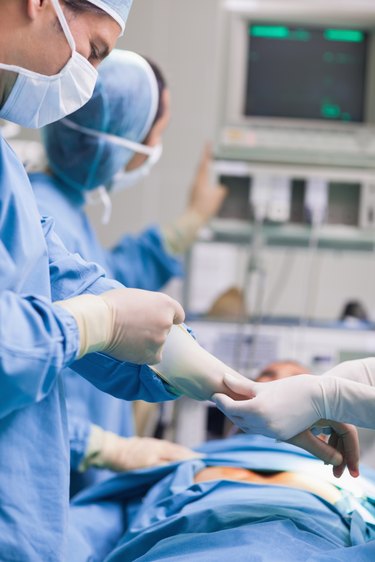
A hernia -- any abnormal opening in the stomach wall -- can occur after gastric bypass surgery. If the abdominal wall gets damaged during this procedure, a weakness in the stomach lining may occur, creating an internal hernia. An incisional hernia is seen when an incision does not heal properly, allowing the abdominal muscles to separate and push a sac-like membrane out of the open incision. Incisional hernias are typically associated with an open procedure while internal hernias are more common with laparoscopic procedures. Any symptoms that indicate a hernia should be evaluated by a medical professional.
Bulge
Video of the Day
Incisional hernias may cause a sac-like membrane to protrude outside of the healing incision. The sac will contain fecal matter or other abdominal waste products. Due to increased pressure in your abdomen, activities such as lifting, straining or coughing may cause the bulge to enlarge. A bulge may be painful, achy or tender when touched. You may also feel a constant pressure or fullness. If left untreated, the hernia can increase in size.
Video of the Day
Abdominal Pain
Pain is the most common complaint with hernia, often described as burning, tearing, sharp, dull and/or pulling pain. Stomach pain can be felt all over the abdominal cavity but is most commonly experienced in the middle portion. You may also experience middle back pain. An initial pain may be felt when the muscles first rupture creating the hernia. Initially the pain may come and go, and present as a stomachache; if left untreated the pain will increase in severity. As the hernia grows, localized pain and pain in other parts of your body may present.
Constipation
When the intestines become strangled by the hernia, bowel movements become very difficult. Constipation and bowel obstruction can result. You may have typical symptoms of constipation including hard stools, difficulty passing stools, straining, bloody stools, bloating and abdominal discomfort.
Nausea and Vomiting
An untreated hernia may cut off the blood flow to organs. In the case of gastric bypass, the small intestine is most at risk for hernia strangulation. If a small bowel obstruction occurs, you will not be able to produce a bowel movement. The backup of bowels through the gastrointestinal tract will cause nausea, vomiting and lack of appetite. If the intestines are only partially blocked, you may experience nausea without vomiting.
Abdominal Inflammation
Abdominal inflammation is typically one of the last symptoms to emerge. You will have an elevated white blood cell count and irritation of the lining of your abdomen. Abdominal inflammation is usually due to an intestinal infarction, which occurs when the blood supply to part of the intestines is cut off. This causes tissue death, or perforation -- small tears, releasing contents into the abdominal cavity.
- Gastrointestinal Imaging: Internal Hernia Following Rouxen-Y Gastric Bypass Surgery for Morbid Obesity -- Evaluation of Radiographic Findings at Small-Bowel Examination
- SUNY Downstate Medical Center: Diagnosis and Management of Internal Hernias in Gastric Bypass Patients
- American Journal of Roentgenology: Internal Hernia After Gastric Bypass -- Sensitivity and Specificity of Seven CT Signs with Surgical Correlation and Controls